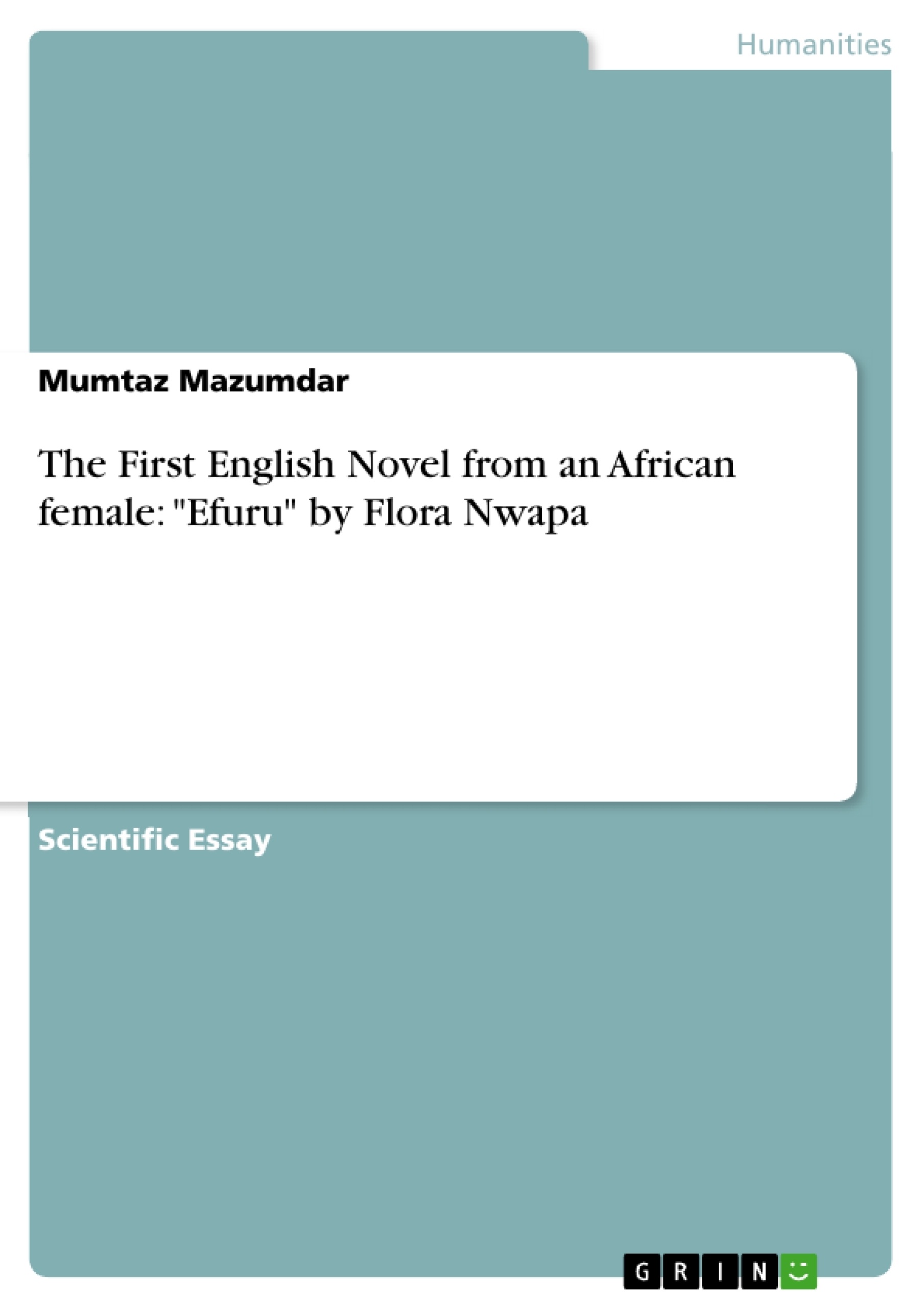The novel ‘Efuru’ is written by Flora Nwapa in the year 1966. Nwapa is the first female writer in English in Nigeria. It is Nwapa who opened up opportunities for other women writers of the future. She showed deep understanding with ordinary Igbo women of her indigenous tribe, trapped in local social situations over which they could exert little control. The male writers earlier had not explicitly represented about the female Igbos. If they had ever done so, it was done in very partial manner and andocentric. It was stereotypical representation. The reality of the Igbo women was first presented by Flora Nwapa. Her novel ‘Efuru’ presents the rural Igbo woman. Economic independence of the rural Igbo woman is one of the themes in the novel. The most important institutions of family and marriage are brought in focus. The ‘episteme’ of the male writers available to readers then, concentrated upon the impacts of the political transformations upon people as the themes, due to recent change of power from the British to the Nigerians. It was at that time just after six years of Independence that Nwapa quickly took up the social issues relating to the Igbo women. The social issues combined the marriage, economic and religious aspects of the Igbo woman. Efuru is the protagonist in the novel. She goes through two marriages. But both her marriages end due to her childlessness. Even her immediate society refuses to be kind to her. Stunned Efuru starts taking refuge in the company of one of the Igbo Goddesses or Mami Wata, named Uhamiri. She becomes a selected worshipper of the Mami Wata. The sub-divisions in the article will show how marriage fails to stable Efuru and an ancient religion comes to give some relief to Efuru.
Key Words Nwapa; Efuru; Mami Wata; Childlessness; Igbo; Economic; Nigeria
Table of Contents
- Introduction
- The Igbo Earning Woman
- The Igbo Marriage
Objectives and Key Themes
This novel, "Efuru," delves into the multifaceted lives of Igbo women in post-colonial Nigeria. Flora Nwapa's work aims to challenge traditional narratives of Igbo society, highlighting the often-overlooked roles and contributions of women.
- The Economic Independence of Igbo Women
- The Social and Cultural Constraints Faced by Igbo Women
- The Role of Religion in Igbo Society
- The Dynamics of Marriage and Family in Igbo Culture
- The Evolution of Igbo Society in the Face of Colonialism and Modernization
Chapter Summaries
The novel begins with an introduction to the Igbo people and their rich oral traditions. The author discusses how male writers in the past have often ignored the significant roles of women in Igbo society. The introduction introduces Efuru, the protagonist of the novel, and explores her independent spirit.
The second chapter focuses on the economic contributions of Igbo women. The author discusses how, despite the traditional division of labor, women have always played a crucial role in agriculture and trade. Efuru's economic success, despite facing challenges due to her childlessness, is highlighted as an example of the strength and resilience of Igbo women.
The third chapter explores the complexities of marriage in Igbo culture. The author discusses how the traditional Igbo concept of marriage is challenged by Adizua's treatment of Efuru. The chapter highlights the double standards that Igbo husbands often practice and explores the impact of Adizua's actions on Efuru's emotional well-being.
Keywords
This novel centers on key themes including Igbo women, economic independence, social constraints, religious beliefs, marriage, family, colonialism, modernization, and the role of tradition in a changing society. The exploration of these concepts, through the compelling story of Efuru, sheds light on the diverse experiences of Igbo women in post-colonial Nigeria.
Frequently Asked Questions
Who is Flora Nwapa and why is she significant?
Flora Nwapa was the first African female writer to publish a novel in English ("Efuru", 1966), opening opportunities for future generations of women writers.
What is the central plot of the novel "Efuru"?
The novel follows the life of Efuru, a rural Igbo woman who experiences two failed marriages and struggles with childlessness while striving for economic independence.
How does the novel represent Igbo women?
Nwapa presents a realistic and multifaceted view of Igbo women, highlighting their economic resilience and the social constraints they face in their society.
What role does the Goddess Uhamiri play?
After her social and marital struggles, Efuru finds refuge in worshipping the Mami Wata Goddess Uhamiri, finding relief in an ancient religious connection.
What are the key themes of "Efuru"?
Key themes include economic independence, the impact of colonialism, the dynamics of Igbo marriage, childlessness, and traditional religion.
How did Nwapa's work differ from male writers of her time?
While male writers focused on political transformations post-independence, Nwapa centered on the social, economic, and religious reality of women, which had previously been stereotyped.
- Quote paper
- Mumtaz Mazumdar (Author), 2013, The First English Novel from an African female: "Efuru" by Flora Nwapa, Munich, GRIN Verlag, https://www.hausarbeiten.de/document/209666


